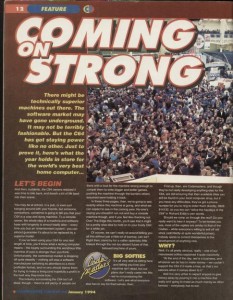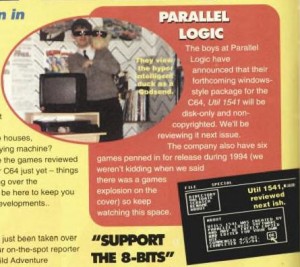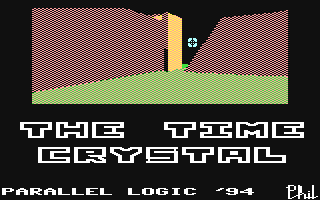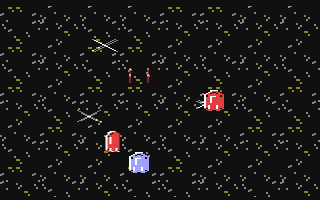Something a little different from GTW, but I recently got speaking with Philip Boyce to find out more about Parallel Logic, which was a short lived company which he ran when still at school, which was aiming to keep the C64 going. I only need to find out a few bits for an article i’m writing, but Phil’s excellent history was something I had to preserve. So here it is in full!…
 “Ok, well a school friend and I wanted to set it up in response to Commodore Format’s ‘call to arms’ in issue 38 (I think) when they told readers that the C64 could still run for years in the underground scene. Of course today this is commonplace, with magazines like Retro Gamer covering how old machines still have buzzing communities and new software, but it was a new concept for many back at this time. We thought it’d be a fun idea to do something.
“Ok, well a school friend and I wanted to set it up in response to Commodore Format’s ‘call to arms’ in issue 38 (I think) when they told readers that the C64 could still run for years in the underground scene. Of course today this is commonplace, with magazines like Retro Gamer covering how old machines still have buzzing communities and new software, but it was a new concept for many back at this time. We thought it’d be a fun idea to do something.
Originally I was interested in writing a paper-based fanzine and we did develop one on Colin’s Amiga but then decided to write software instead. Colin (McMaster) came up with the name as a reference to the Commodore’s parallel port and the logic tables we were studying at the time in Computing in school. Colin developed Comsoft Windows, a disk utility programme based on Windows but never got it 100% finished before he moved on to the Amiga. I finished off some SEUCK and 3DCK games I’d started on and then spent a while collecting PD software together and turning Parallel Logic into the PLPD library.
When Commodore Format folded I went back to the magazine idea and created Commodore Diskette, a diskzine which I was incredibly proud of. Before the days of social networking I contacted people through the UK via post and phone who were working on games etc and asked them to write articles. They were very happy to and sent me them on paper and I’d painstakingly code them into the magazine. It was made up of a combination of BASIC-coded pages (right shift key forward a page, left shift back a page, run/stop to return to the turbo loader menu I seem to recall) and others created using PD demo makers. The first issue (I think) even had a never-before-seen demo of a brand new game coded by a fellow named Jonathan from Portadown over here in Northern Ireland. I remember he’d appeared at my door without warning some night, introduced himself and showed me his demo, wanting to know if Parallel Logic (with the contacts I’d made) would be interested in developing it. I can’t even remember the name of it now!
 Three issues were made before my 17-year old brain and its attention-deficit ways decided to move on to other things, annoyed I wasn’t selling much. Ironically, after I stopped I started to get subscription orders, as it’d made its way into other fanzines and had gotten rave reviews and so interest only started to begin after those issues. Looking back I’d had great feedback from Commodore Format about the software (and that’s me with the duck in #42 or #44), and about the plans for the future and PLPD was in the top three PD libraries in the UK according to them! But I was always moving onto other projects and never finishing what I started.
Three issues were made before my 17-year old brain and its attention-deficit ways decided to move on to other things, annoyed I wasn’t selling much. Ironically, after I stopped I started to get subscription orders, as it’d made its way into other fanzines and had gotten rave reviews and so interest only started to begin after those issues. Looking back I’d had great feedback from Commodore Format about the software (and that’s me with the duck in #42 or #44), and about the plans for the future and PLPD was in the top three PD libraries in the UK according to them! But I was always moving onto other projects and never finishing what I started.
Those “future plans” were to collaborate with PD demo makers to make intro and outro sequences for 3DCK games as there weren’t many of these appearing and I saw a gap in the market for Freescape games. Commodore Diskette was also going to go monthly (it was bi-monthly to begin with) and an annual Christmas buyer’s guide was in the works, inspired by 3DO Magazine at the time.
 As for sales, the PD library was very, very slow and the SEUCK games never really sold so were placed straight into the PD library’s catalogue. The Time Crystal, the 3DCK game, generated a good amount of interest though. Commodore Format’s review only gave it 45% but they made it clear this was because of Freescape itself and that for fans of these slow, slow, ssllooowww adventures games there was much to enjoy and was very well designed. It sold about 20 copies, then I placed it into the PD library as a way of generating interest in 3DCK games (for those future plans) and I sold a lot more then as it was cheaper and came bundled with demos of other games. Altogether, possibly about 70 or so. Doesn’t sound like a lot, but it was great for me! I’d created it in my bedroom and it was the first title I released as a teenage boy still at school – I didn’t expect to sell any!
As for sales, the PD library was very, very slow and the SEUCK games never really sold so were placed straight into the PD library’s catalogue. The Time Crystal, the 3DCK game, generated a good amount of interest though. Commodore Format’s review only gave it 45% but they made it clear this was because of Freescape itself and that for fans of these slow, slow, ssllooowww adventures games there was much to enjoy and was very well designed. It sold about 20 copies, then I placed it into the PD library as a way of generating interest in 3DCK games (for those future plans) and I sold a lot more then as it was cheaper and came bundled with demos of other games. Altogether, possibly about 70 or so. Doesn’t sound like a lot, but it was great for me! I’d created it in my bedroom and it was the first title I released as a teenage boy still at school – I didn’t expect to sell any!
But the slow start to the diskzine put me off. I thought it was an indicator of things to come and it’d take months of hard work to create each 3DCK, and this would be on top of Commodore Diskette. I didn’t know those reviews would’ve changed my fortunes!
To this day I’m positive if I’d stayed at it I’d have had quite a lucrative diskzine and 3DCK game company for a year or so!
These days Colin is in Texas working for a big oil company  and doing exceedingly well for himself, he and his wife have just had their first child! I was working for the BBC for over 5 years in their complaints department and have recently left to concentrate on writing professionally – that bug I got with Commodore Diskette never went away! I’ve been writing a blog based on an old 80s UK comic called Oink! (http://the-oink-blog.blogspot.co.uk) for about a year and a half now and running the corresponding Facebook group. It’s proved exceedingly popular and reminds me of how I felt with Time Crystal’s “success”. The professional writers and cartoonists I’ve gotten to know have been encouraging me to follow that dream of writing based on what they’ve read in the blog, so I’m actually working on my first book now, which I can’t go into yet, sorry!
and doing exceedingly well for himself, he and his wife have just had their first child! I was working for the BBC for over 5 years in their complaints department and have recently left to concentrate on writing professionally – that bug I got with Commodore Diskette never went away! I’ve been writing a blog based on an old 80s UK comic called Oink! (http://the-oink-blog.blogspot.co.uk) for about a year and a half now and running the corresponding Facebook group. It’s proved exceedingly popular and reminds me of how I felt with Time Crystal’s “success”. The professional writers and cartoonists I’ve gotten to know have been encouraging me to follow that dream of writing based on what they’ve read in the blog, so I’m actually working on my first book now, which I can’t go into yet, sorry!
Well there you go. It was all too brief and sometimes I wish I could go back and give it another go with hindsight, to stick with the magazine and start another game. Who knows where it would’ve led. But the future is looking bright and along with the book I’m also looking at script writing work and the possibility of an indie magazine too.”

I don’t ever recall seeing anything from these guys.
Nice story. Thanks for sharing it :-)